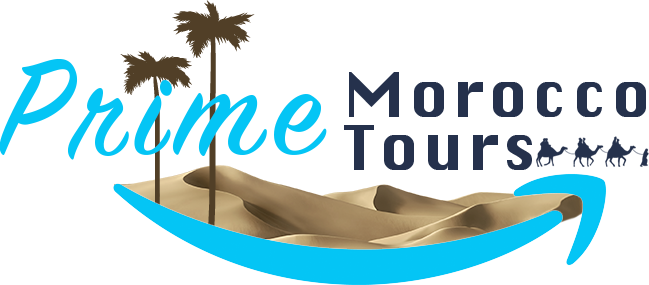Ramadan Rituals and Traditions in Morocco
Ramadan, the ninth month of the Islamic lunar calendar, is a time of spiritual reflection, self-discipline, and community in Morocco. It is considered the holiest month for Muslims worldwide, and in Morocco, it is observed with unique rituals, customs, and traditions that reflect the country’s rich cultural heritage and strong sense of family and community. From the pre-dawn meal to the evening celebrations, Moroccan Ramadan rituals are an important aspect of daily life during this sacred time.
The Significance of Ramadan in Morocco
Ramadan holds great significance in Moroccan society, as it does in other Muslim-majority countries. It is a time when Muslims fast from dawn until sunset, refraining from eating, drinking, smoking, and engaging in impure actions. Fasting is not only a form of worship but also a means of deepening one’s spirituality and empathy for the less fortunate. For many, it is a time to purify both the soul and body, strengthen family bonds, and reconnect with faith.
The end of Ramadan is marked by Eid al-Fitr, a grand celebration that brings families, friends, and communities together to mark the conclusion of a month of devotion and sacrifice.
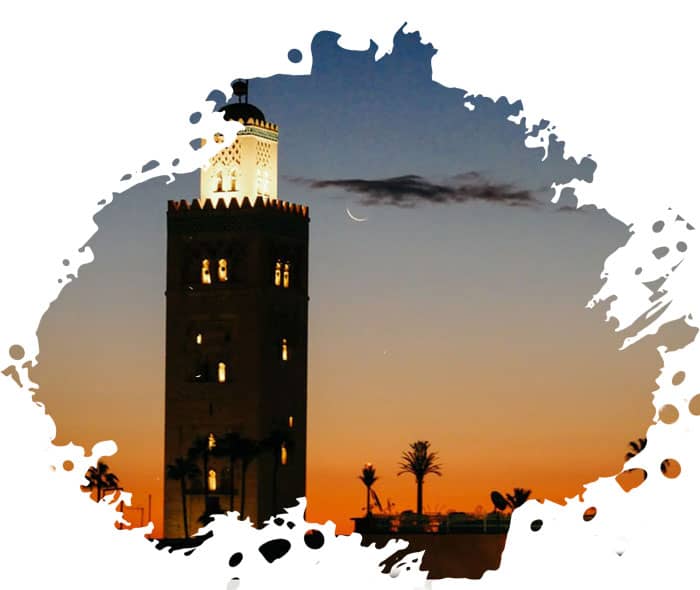
Pre-Dawn Meal: Suhoor
The day of fasting begins before dawn with the pre-dawn meal known as suhoor. In Morocco, this meal is crucial for sustaining energy throughout the day of fasting. Traditionally, it includes light and nutritious foods like bread, olives, yogurt, dates, and soups, accompanied by mint tea or milk. It is a time for families to gather before the day begins, sharing a peaceful moment before the fast starts at sunrise. The suhoor is often eaten at least an hour before Fajr (the day’s first prayer), ensuring everyone has the energy they need to last through the day.
The Call to Fasting: Fajr and the Importance of Intentions
Fajr marks the beginning of the fast at dawn, with the adhan (call to prayer) being heard throughout the country. The call signifies the time when all Muslims are required to abstain from food and drink until sunset. It is also the moment when many Moroccans renew their intention to fast, often with quiet personal prayers of gratitude, strength, and devotion. The fast is not only physical but also spiritual, requiring self-restraint and mindfulness throughout the day.
A Day of Reflection and Worship
Throughout the day, Moroccan Muslims observe the fast with quiet reflection, prayers, and acts of charity. In Morocco, people engage in dhikr (remembrance of God), read the Qur’an, and attend the mosque for special Ramadan prayers, such as Taraweeh, which are performed after the Isha (night) prayer. It’s common for people to visit mosques for communal prayers, where the community comes together to pray for peace and blessings.
During Ramadan, Moroccans also take the opportunity to perform acts of charity, or sadaqah, supporting those in need. Many local communities organize food drives or distribute meals to the less fortunate, ensuring that no one goes without during this sacred time. The spirit of generosity is an integral part of Moroccan Ramadan traditions.
Breaking the Fast: Iftar
The moment that all Moroccans look forward to each day is the time for iftar — the evening meal that breaks the fast at sunset. The moment of breaking the fast is a beautiful tradition in Morocco, often marked by the sound of cannon fire or the adhan call. Families and friends gather around the table to share a bountiful meal. In Moroccan culture, it is customary to begin iftar with dates and a glass of water or milk, following the teachings of the Prophet Muhammad.
Following this, the meal typically includes harira, a hearty soup made from tomatoes, lentils, chickpeas, and meat. It’s a staple of Moroccan Ramadan meals and is known for being both nourishing and comforting. Alongside harira, you’ll often find fresh bread, olives, and chebakia — a delicious honey-sesame pastry.
Mint tea, often referred to as “Moroccan whisky,” is served throughout the evening, as is sfenj (Moroccan doughnuts), briouats (fried pastry filled with meat or cheese), and a variety of sweet and savory dishes. The iftar meal is not just about breaking the fast, but about reconnecting with family and community, enjoying the warmth of shared meals and laughter.
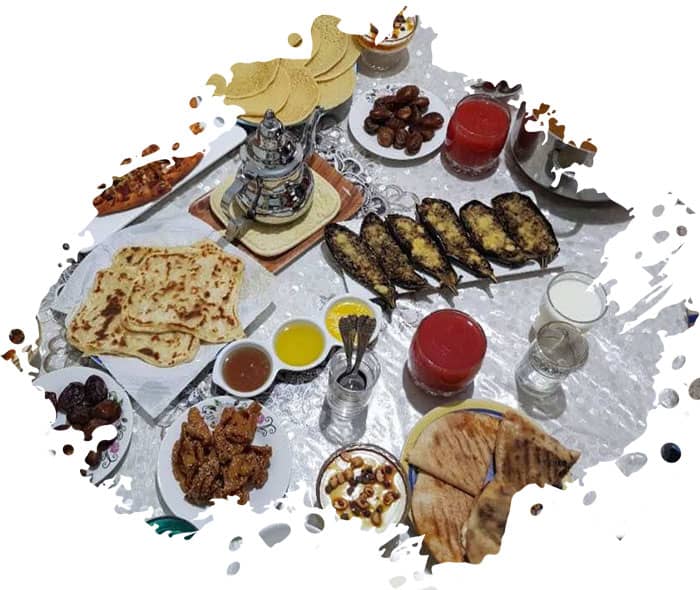
Experience Ramadan in Morocco – A Journey of Culture & Tradition!
Join us for an unforgettable cultural tour and experience the beauty of Moroccan traditions during Ramadan. Book now and be part of this unique spiritual journey!
Nighttime Celebrations and Socializing
Ramadan nights in Morocco are filled with vibrant social gatherings. After the iftar meal, families often gather for dessert and tea while enjoying conversation or watching traditional Ramadan TV shows. The evening is also the time for further prayers, especially the Taraweeh prayers, which are longer prayers performed at the mosque in the evenings. These prayers, led by an imam, include the recitation of large portions of the Qur’an.
The Moroccan Ramadan nights come alive with street vendors selling snacks, fruits, and drinks, and people stroll through the markets, enjoying the evening breeze. Many Moroccan cities and towns light up their streets with festive decorations, creating an atmosphere of joy and community. The Ramadan spirit is one of togetherness, and the streets are often filled with the sounds of chatter, laughter, and the clinking of glasses.
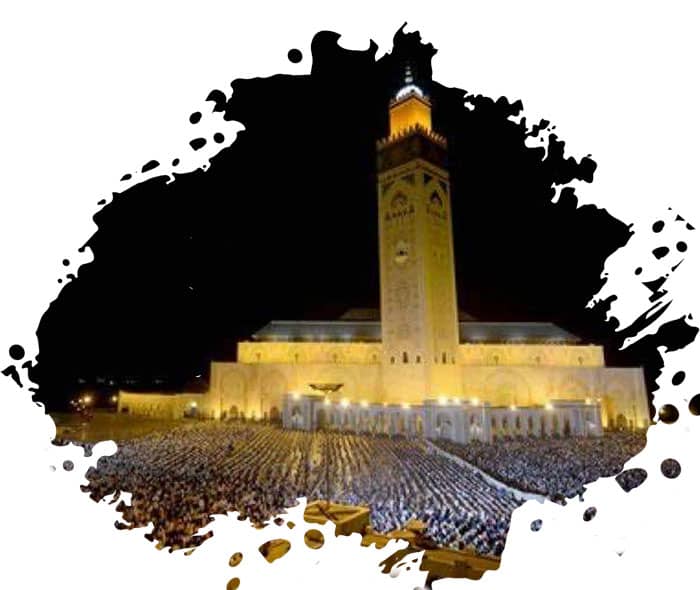
The Spirit of Charity: Zakat
During Ramadan, giving to the poor becomes even more significant. Moroccans typically pay zakat (almsgiving), one of the Five Pillars of Islam, during the month of Ramadan. This is a mandatory act of charity that helps those in need, ensuring that the less fortunate can also enjoy a special Ramadan. Many Moroccan families make special efforts to give to local mosques, charity organizations, or directly to individuals in their community.
Eid al-Fitr: The Grand Celebration
The culmination of Ramadan is marked by Eid al-Fitr, a grand celebration that is the most important holiday in Morocco. The day begins with a special prayer at the mosque, followed by a festive meal and time spent with family. It’s a time of immense joy and gratitude, where families gather to share lavish meals and exchange gifts. People wear their finest clothes, and there are often street parties and gatherings with friends and extended family.
One of the traditions of Eid is visiting the graves of loved ones to pray for their souls, a way of honoring the past while celebrating the present. The holiday is also marked by feasts, with special dishes such as lamb or chicken with almonds, couscous, and an array of sweets.
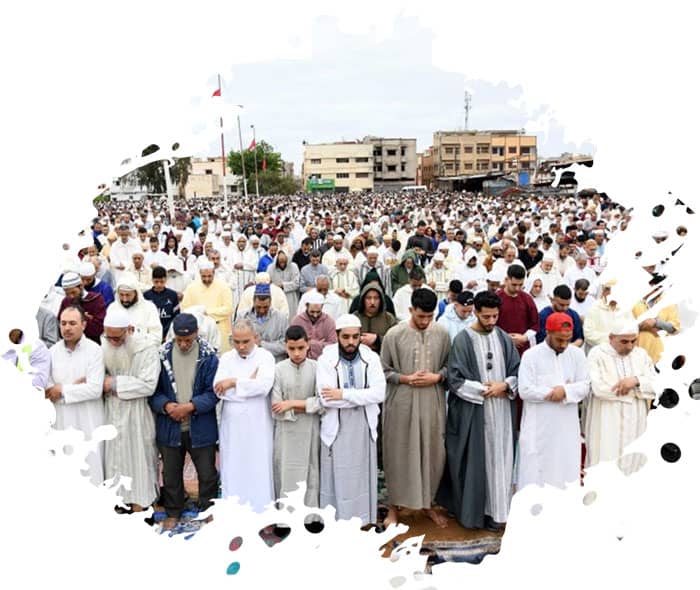
Conclusion
Ramadan in Morocco is a time of deep spiritual reflection, family bonding, and communal celebration. The customs and rituals that are practiced throughout the month reflect the importance of charity, faith, and unity in Moroccan society. From the pre-dawn meals to the grand celebrations of Eid al-Fitr, Ramadan provides a rich cultural and spiritual experience for Moroccans. It is a time to reconnect with faith, family, and community, and to reflect on the values of generosity, patience, and gratitude. Whether in bustling cities or quiet villages, the rituals and traditions of Ramadan are woven deeply into the fabric of Moroccan life, making it a truly unique and beautiful time to experience the country.
